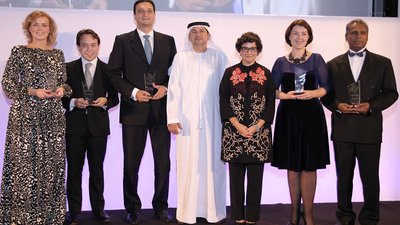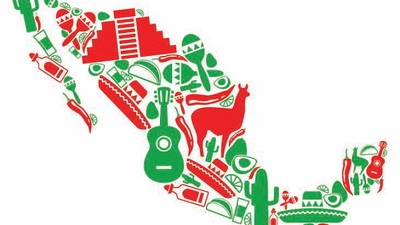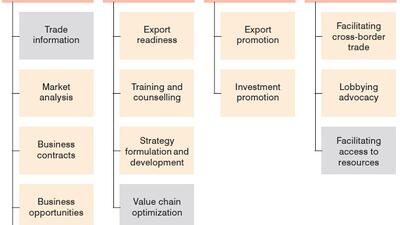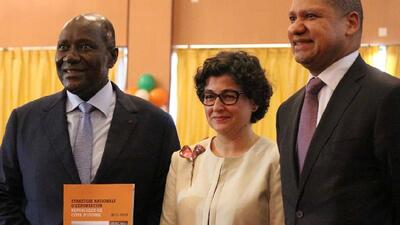Boosting communities through export opportunities
Mango growers in Senegal, coffee producers in Uganda and information technology (IT) companies in Bangladesh are all benefitting from a project led by the International Trade Centre (ITC) and the Netherlands’ Centre for the Promotion of Imports from Developing Countries (CBI) designed to improve the competitiveness of exporters in developing countries.
The second phase of the Netherlands Trust Fund (NTF II) was launched in April 2009 in selected industries in Bangladesh, Kenya, Senegal, South Africa and Uganda. Seeking to stimulate trade-led growth and promote the participation of developing countries in global value chains, NTF II was the continuation of a collaboration between ITC and CBI stretching back to 2005.
Expanding exportsIn Senegal and Uganda, NTF II and its partners extended training and technical assistance to 1,000 mango growers and 5,000 coffee producers who have been able to secure regular work thanks to improved processes. The launch of commodity business plans in Kenya is set to benefit thousands of producers by connecting them with export-led supply chains.
In South Africa’s automotive sector, the project has helped to raise company profits, which again has led to more stability in the sector and, in some cases, more jobs. In Bangladesh, as orders have increased, IT and IT enabled services (ITeS) companies have managed to put themselves in a stronger position, allowing them to employ more people. Women have also been active participants in NTF II projects in Bangladesh, Senegal and Uganda, and have benefitted from a better understanding of quality management and export market requirements.
By focusing on the sectors deemed most likely to create employment and thus facilitate poverty alleviation, NTF II has been a success story. For example, one Bangladeshi company’s workforce surged from seven to more than 100 people in 2012. That number might seem small, but to the people benefitting from those employment opportunities – as well as their families and communities – it is another step towards realizing their potential in the global value chain.
The NTF II programme, which was funded by the Dutch government, was designed to increase people’s incomes and reduce poverty by improving exporter competitiveness in the near term and by building the institutional infrastructure to promote competitiveness more sustainably in the medium term. As such, NTF II aimed to tackle weaknesses in selected value chains where the most value is lost. Much of this was down to supply constraints caused by breakdowns in the value chain, from production to delivery to the end consumer. The result has been a situation where output does not match demand, costs are excessive, quality does not match international standards, and key services, such as logistics and marketing, are inadequate.
NTF II also aimed to address weaknesses in trade support institutions. Often trade support services in developing countries do not give exporters the edge they need to target international markets. To balance this, NTF II sought to enhance the capacity of selected support organizations and as such provide more effective services and to implement rigorous monitoring mechanisms to help them measure the impact of their work.
Strengthening competitivenessNTF II assisted in providing a better understanding of value-chain performance and how to upgrade the export competitiveness of small and medium-sized enterprises. It strengthened existing or developed new services for exporters, implemented and improved monitoring and evaluation processes, and boosted companies’ competitiveness. Combined, these efforts have resulted in better export production, quality and marketing, as well as in improved links with buyers and the signing of new export contracts.
A sip of success in Uganda
Oliver Naray, NTF II Project Manager, ITC
In Uganda the second phase of the Netherlands Trust Fund (NTF II) project has assisted the country’s coffee farmers in better understanding their product and their markets. It has also ensured that they get a higher price for their crops.
The aim of the NTF II Uganda project was to make Uganda’s coffee industry more competitive and sustainable for the environment, as well as for local communities. To achieve this, NTF II has sought to strengthen the institutional capacities of umbrella organizations such as the National Union of Coffee Agribusiness and Farm Enterprises (NUCAFE), and by promoting a farmer-ownership model among small-scale growers. The project has contributed to the United Nations Millennium Development Goals by building on the coffee sector’s potential to improve the livelihood of producers by increasing output and enhancing the efficiency of the value chain.
One of the most innovative aspects of the project has been the involvement of local public and private partners in both management and monitoring. Two government agencies – the Uganda Export Promotion Board and the Uganda Coffee Development Authority – have been actively involved, as well as the private sector-run NUCAFE, which represents 155 coffee farmer associations around the country.
‘For the first time, we have seen a change in approach towards implementing coffee projects in Uganda,’ said NUCAFE Executive Director Joseph Nkandu. ‘This time around, the NTF II project has gone much further in reaching out to an organization like NUCAFE that has strong links with farmers at the grass-roots level and directly providing capacity building at farm level.’
Complementing other technical assistance programmes run by NUCAFE, in particular its gender-equality efforts, NTF II has helped to bolster the capacity of family members to participate in decision-making at their farms and to use the resources they generate fairly. This has assisted in empowering women and has allowed them to improve their living standards while ensuring that their children remain in school instead of in the field. It has also encouraged farmer associations to register, create organizational structures and increase their sales of processed and graded coffee beans.
By developing market linkages, improving farmer knowledge and skills in export marketing, and the 4C code of conduct (the baseline standard for sustainability in the coffee sector), more coffee producers in Uganda have opted to participate in high-end levels of the export value chain, attracting an average of US$ 2.30 per kilogram. During the course of the project, coffee growers have shipped more than 14,000 bags of coffee worth more than US$ 2.5 million to Europe through farmer associations. Support through NTF II has also enhanced business relationships at the various international trade shows and buyer visits in the country. Market linkages have been made in Italy, China, Japan, Canada, Belgium and the United States, and the market base has been expanded to include domestic and international markets, with more than 15 buyers in the specialty-market segment.
‘The project has helped us with coffee knowledge,’ said Charles Lubumbira, a coffee farmer in the Mukono District. ‘Today we can harvest better coffee and we are able to get better prices.’









